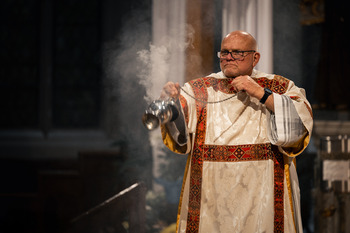-
 July 3, 2025
July 3, 2025By Cosme Cham
As we celebrate the ordination of nine new deacons for the diocese, we reflect on the duties and the special calling of the diaconate for the Church. Although the Second Vatican Council restored the diaconate to its permanent place within the hierarchy, its roots stretch back to apostolic times. The first seven deacons were instituted (Acts 6:1-6) to assist the Twelve Apostles in the mission of the Church. Stephen boldly proclaimed the Gospel and was the first martyr. (Acts 6:8-15, 7:54-60) Philip, known as the Evangelist, catechized and baptized. (Acts 8:26-40)
THE ROLE OF DEACONS (From the Greek “dia-konos” or “servant”): It is always good to remind us that a deacon is not a substitute for priests, nor is he a solution for a shortage of priests. Holy orders is the sacrament by which bishops, priests and deacons are ordained and receive the power and grace to perform their sacred duties. All three have been present since Jesus founded the Church. Unlike a bishop or a priest, who receive the mission and faculty (‘the sacred power’) through ordination to act in persona Christi capitis (in the person of Christ, the head), deacons share in Christ’s mission and grace in a special way — in the person of Christ, the servant (in persona Christi servi”).
The sacrament of holy orders marks them with an imprint that cannot be removed and configures them to Christ, who made himself the “deacon” or servant of all. (Catechism of the Catholic Church 1570)
Deacons serve people of God through participating in their local bishop’s ministry; services, or “diaconias” of liturgy, word and charity, in communion with the bishop and his presbyterate.”Through ordination, deacons can baptize, witness marriages, perform funeral and burial services outside of Mass and preach the sermon during the Mass. They also minister in their respective communities and are obligated to pray the Liturgy of the Hours/Divine Office every day.

PERMANENT AND TRANSITIONAL DEACONS
The diaconate is the first of the three holy orders. In the context of formation and for structural purposes, the Church distinguishes deacons as “permanent and transitional.”
All men ordained as deacons are deacons always. Unmarried men whose vocation is to be priests will be ordained deacon and then be ordained priests after a suitable period of time. To distinguish that they are preparing for the priestly vocation, they are usually called “transitional deacons.” However, the one who goes on to be a priest or even bishop will still remain permanently a deacon by virtue of holy orders.
Some characteristics of a good deacon:
Has a sense of being called and a desire for holiness
Has a strong and deep prayer life
Is a man of the word of God
Is a man of the Church
Is a man of the community
Has a desire to serve Christ in the sick, the poor and the outcast
If married, with his spouse, gives witness to the vocation of holy matrimony
Be sacramentally and liturgically competent (confident and faithful to the rubrics and instructions)
